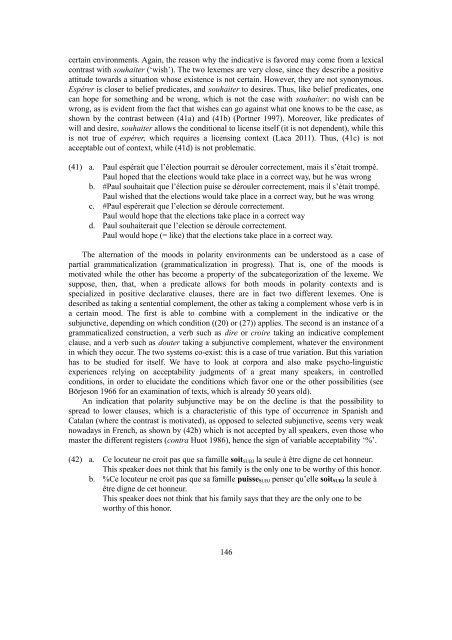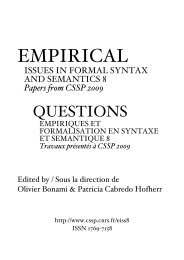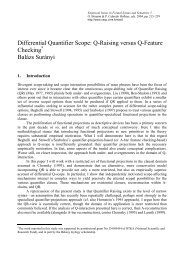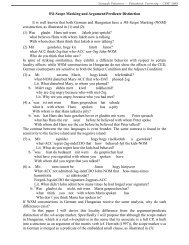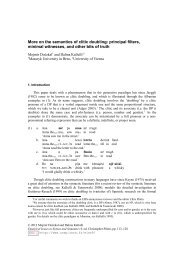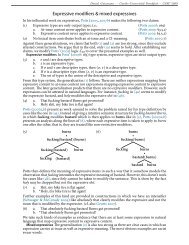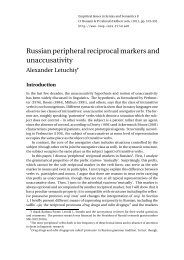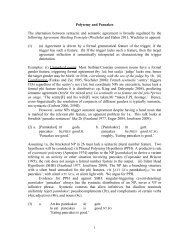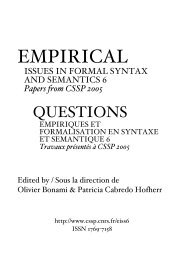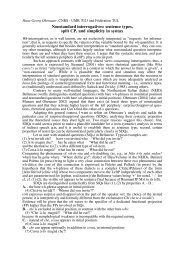Empirical Issues in Syntax and Semantics 9 (EISS 9 ... - CSSP - CNRS
Empirical Issues in Syntax and Semantics 9 (EISS 9 ... - CSSP - CNRS
Empirical Issues in Syntax and Semantics 9 (EISS 9 ... - CSSP - CNRS
Create successful ePaper yourself
Turn your PDF publications into a flip-book with our unique Google optimized e-Paper software.
certa<strong>in</strong> environments. Aga<strong>in</strong>, the reason why the <strong>in</strong>dicative is favored may come from a lexical<br />
contrast with souhaiter (‘wish’). The two lexemes are very close, s<strong>in</strong>ce they describe a positive<br />
attitude towards a situation whose existence is not certa<strong>in</strong>. However, they are not synonymous.<br />
Espérer is closer to belief predicates, <strong>and</strong> souhaiter to desires. Thus, like belief predicates, one<br />
can hope for someth<strong>in</strong>g <strong>and</strong> be wrong, which is not the case with souhaiter: no wish can be<br />
wrong, as is evident from the fact that wishes can go aga<strong>in</strong>st what one knows to be the case, as<br />
shown by the contrast between (41a) <strong>and</strong> (41b) (Portner 1997). Moreover, like predicates of<br />
will <strong>and</strong> desire, souhaiter allows the conditional to license itself (it is not dependent), while this<br />
is not true of espérer, which requires a licens<strong>in</strong>g context (Laca 2011). Thus, (41c) is not<br />
acceptable out of context, while (41d) is not problematic.<br />
(41) a. Paul espérait que l’élection pourrait se dérouler correctement, mais il s’était trompé.<br />
Paul hoped that the elections would take place <strong>in</strong> a correct way, but he was wrong<br />
b. #Paul souhaitait que l’élection puise se dérouler correctement, mais il s’était trompé.<br />
Paul wished that the elections would take place <strong>in</strong> a correct way, but he was wrong<br />
c. #Paul espérerait que l’election se déroule correctement.<br />
Paul would hope that the elections take place <strong>in</strong> a correct way<br />
d. Paul souhaiterait que l’election se déroule correctement.<br />
Paul would hope (= like) that the elections take place <strong>in</strong> a correct way.<br />
The alternation of the moods <strong>in</strong> polarity environments can be understood as a case of<br />
partial grammaticalization (grammaticalization <strong>in</strong> progress). That is, one of the moods is<br />
motivated while the other has become a property of the subcategorization of the lexeme. We<br />
suppose, then, that, when a predicate allows for both moods <strong>in</strong> polarity contexts <strong>and</strong> is<br />
specialized <strong>in</strong> positive declarative clauses, there are <strong>in</strong> fact two different lexemes. One is<br />
described as tak<strong>in</strong>g a sentential complement, the other as tak<strong>in</strong>g a complement whose verb is <strong>in</strong><br />
a certa<strong>in</strong> mood. The first is able to comb<strong>in</strong>e with a complement <strong>in</strong> the <strong>in</strong>dicative or the<br />
subjunctive, depend<strong>in</strong>g on which condition ((20) or (27)) applies. The second is an <strong>in</strong>stance of a<br />
grammaticalized construction, a verb such as dire or croire tak<strong>in</strong>g an <strong>in</strong>dicative complement<br />
clause, <strong>and</strong> a verb such as douter tak<strong>in</strong>g a subjunctive complement, whatever the environment<br />
<strong>in</strong> which they occur. The two systems co-exist: this is a case of true variation. But this variation<br />
has to be studied for itself. We have to look at corpora <strong>and</strong> also make psycho-l<strong>in</strong>guistic<br />
experiences rely<strong>in</strong>g on acceptability judgments of a great many speakers, <strong>in</strong> controlled<br />
conditions, <strong>in</strong> order to elucidate the conditions which favor one or the other possibilities (see<br />
Börjeson 1966 for an exam<strong>in</strong>ation of texts, which is already 50 years old).<br />
An <strong>in</strong>dication that polarity subjunctive may be on the decl<strong>in</strong>e is that the possibility to<br />
spread to lower clauses, which is a characteristic of this type of occurrence <strong>in</strong> Spanish <strong>and</strong><br />
Catalan (where the contrast is motivated), as opposed to selected subjunctive, seems very weak<br />
nowadays <strong>in</strong> French, as shown by (42b) which is not accepted by all speakers, even those who<br />
master the different registers (contra Huot 1986), hence the sign of variable acceptability ‘%’.<br />
(42) a. Ce locuteur ne croit pas que sa famille soit SUBJ la seule à être digne de cet honneur.<br />
This speaker does not th<strong>in</strong>k that his family is the only one to be worthy of this honor.<br />
b. %Ce locuteur ne croit pas que sa famille puisse SUBJ penser qu’elle soit SUBJ la seule à<br />
être digne de cet honneur.<br />
This speaker does not th<strong>in</strong>k that his family says that they are the only one to be<br />
worthy of this honor.<br />
146


